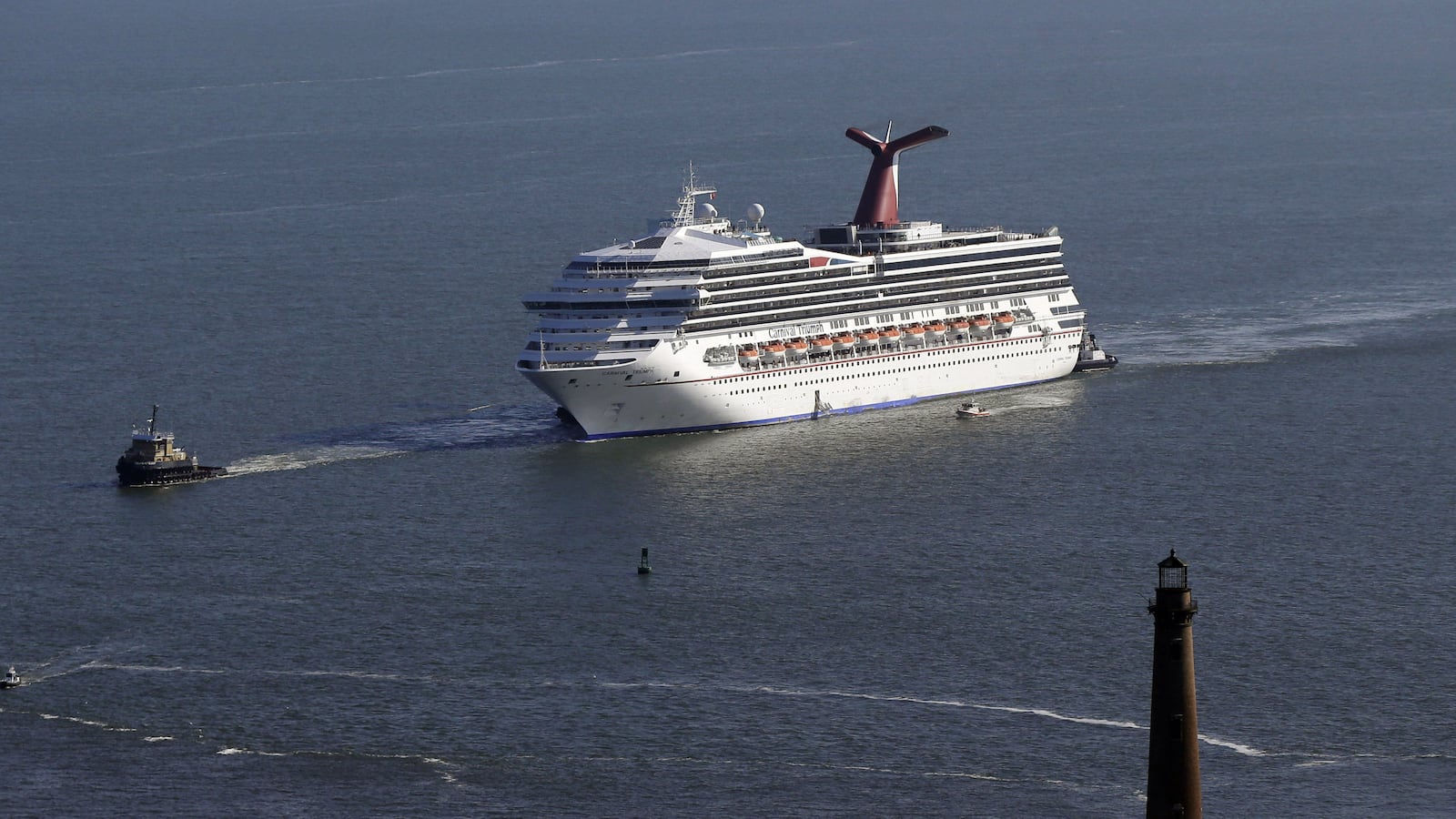Carnival’s Caribbean cruise ship, paradoxically enough named the Triumph, is at the center of a massive global media storm. “Passengers on a stricken cruise ship in the Gulf of Mexico are enduring a nightmare after days without power, waiting hours for sparse meals and relieving themselves in plastic bags,” announced the AFP this morning, and since then every news organization had tried to outdo each other with stories of how unsanitary the conditions are aboard.

NPR had it as its second morning news story; CNN has found a medic to describe the ship as “a floating Petri dish;” France 24 quotes a passenger as saying: “We have to use the bathroom in these bags in the trash can. Then we have to take it into the hall and put it in these bigger bags, it is so—you know, it is not good. And the smell, oh.” Never knowingly outdone for hyperbole, The Sun of London has described how passengers “have been forced to live among decks covered with vomit, urine and human waste.”
No one has died, unlike in other news stories around the globe from Iraq to Mexico. Only one person has had to be taken off the ship for health reasons, although admittedly her family is called Colon, so there might have been a cruelly humorous subtext intended by editors. Yet overall the media absolutely adores cruise-ship stories, especially if they can be connected to effluent. When the Cunard liner, the Queen Victoria, had an outbreak of norovirus, which only struck 78 of the three thousand passengers—a mere 2.6 percent—on its maiden voyage, the media went into an equally unappetizing feeding frenzy.
This is because cruising stories allow the media to indulge in two of their favourite traits: envy and snobbery. Nothing appeals more to editors than such “Hell in Paradise” tales. The subtext of all this coverage is “We might be enduring blizzards, but it’s OK because all those rich swine who’ve paid all that money for their tropical holidays are instead having to pee into plastic bags.” As well as sheer schadenfreude, there’s also the condescending sneer that cruising is only for the “newly-wed, overfed, and nearly dead.”
Well, I love going on cruises, and I will now convert you to the concept. Admittedly, as an itinerant guest-lecturer I don’t actually pay the $16,000 per couple that two weeks on one of the “Top Six” cruise lines might cost you, but that often includes free drink, all tips, and the Malossol sevruga served at lunch.
The first glory of cruising in places like the Mediterranean is that you can visit eight or nine fascinating, historic cities in a fortnight, yet only unpack and pack once. You spread out in your cabin—287 square feet with 58-square-foot balconies on Silversea, for example—and the cities are brought to you. You open your curtains onto the Acropolis one morning, a couple of days later it’s the Topkapi Palace, then Sebastapol, Yalta, and so on, all without having to catch cabs to airports, take off your shoes for security screenings, and check in and out of a series of hotels. The sheer ease of it all is the key to cruising.
Then there are the other passengers; forget all those stereotypes whom you assume are to be found on cruises; there simply aren’t snobs fighting over who dines at the captain’s table, elderly crooners reliving their former days, or shipboard romances between recently widowed millionairesses and sharp-looking conmen. In fact they tend to be smart, well dressed, comfortably off, and of an age mature enough to appreciate a little luxury. One meets the best kinds of foreigners, and the Russians don’t seem to have discovered cruises yet. Only the freeloading guest-lecturer is a genuine stereotype, and, speaking as one, I’ve never even seen a game of deck quoits played. Plus, you’re never forced to eat with people you don’t want to.
Nor is seasickness an issue, because of the wonder-drug Meclizine, sold as Sea Calm. It knocks you out for 24 hours, admittedly, but after that the ship can retrace the path of George Clooney’s trawler in A Perfect Storm without any effect on your guts.
One problem, even though there are usually good gyms aboard, is keeping weight off, especially as lines like Seabourn, Crystal, and especially Silversea concentrate on providing really superb cuisine. If you don’t watch out, you can get on as a passenger but get off as baggage. The solution is to choose those shore excursions where you do lots of walking, up sand dunes in the Namibian desert, or round the 1776 Boston trail, or over the Crimean War battlefields, rather than take the ones that send you on a four-hour coach trips to a Ukrainian basket-weaving factory. It’s not hard to differentiate beforehand, especially if you hit www.cruisecritic, where we cruise enthusiasts swap our experiences.
Some boutique cruise companies concentrate on the intellectual side of cruising, with lectures given by historians and former ambassadors to the countries visited. Magazines such as the National Review, Weekly Standard, and The Nation all hold cruises where you can discuss important issues of the day with your favorite writers as you visit the Alaskan coastline or the Caribbean islands. Only one in the tens of thousands of cruises taken every year has to go wrong, however, for the entire industry to be treated to the same kind of avalanche of effluent that the Carnival Triumph seems to be dealing with this week.





